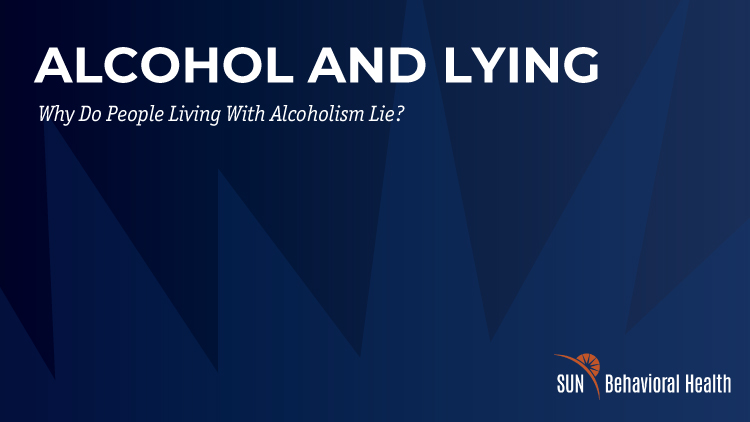Services

Your loved one comes home late at night. You’ve been waiting for them for hours, sitting on the couch with your eye on the door. When they finally do arrive, they seem disoriented, and when you get close to them, you can smell alcohol. “Have you been drinking?” you ask them, even when you already know the answer. “No,” they say, despite obvious evidence indicating otherwise.
As time goes on, this situation plays out over and over again, always with lies from your loved one even though you know better. Why would they lie about something so obvious to anyone observing them?
If your loved one is lying about their drinking habits, they probably aren’t among the 5% of adults in Delaware who self-reported as chronic heavy drinkers in 2021. Considering many people don’t want to self-report their alcohol consumption if they believe it’s significant, the number of actual chronic heavy drinkers in Delaware is likely higher. Lying about having an alcohol use disorder doesn’t make it any less real, or mean the person lying doesn’t need help. The first step toward getting help for people lying about their alcoholism is gaining more knowledge about the situation. Let’s take a look at the correlation between alcohol and lying.
There are a lot of reasons alcohol and lying go hand in hand. Even if it doesn’t make sense to those living a substance-free life, those with alcohol use disorder view it differently. If you want to help someone living with alcohol use disorder, you’ll need to understand where they’re coming from, even when they lie.
People start drinking for different reasons. Sometimes it starts with social drinking that spirals out of control, or one drink after a hard day at work. While drinking itself isn’t necessarily harmful, and may not come from a place of pain, alcohol use disorders often do. Many people with alcohol use disorder use alcohol to cope with problems in their lives. This often occurs due to a lack of healthy coping mechanisms. Alcohol has a way of numbing emotional pain, and being intoxicated can feel relaxing or enjoyable to those experiencing a difficult time in their lives. Alcohol becomes an “escape” of a sort from problems.
If the person has an alcohol use disorder, their alcohol use in itself is a problem. People lie not just to avoid losing the coping mechanism of drinking, but so they don’t have to acknowledge they have another problem: excessive alcohol use. They may even lie to themselves about their alcohol use being a problem.
When drinking becomes a coping mechanism for someone, it’s understandable that they don’t want to give it up. Additionally, their body and brain are used to alcohol in their system, so the person with alcohol use disorder can experience painful alcohol withdrawal symptoms when they go too long without drinking. It makes for a difficult, vicious cycle to break and lying can become a defense mechanism they use in hopes of avoiding doing so.
Even people without alcohol use disorder sometimes lie to avoid confrontation. Many human beings are conflict-averse, and having an alcohol use disorder doesn’t change that. Maybe they fear a fight with a family member, or that someone might try to force them into admitting they have an alcohol use disorder.
Sometimes, people with an alcohol use disorder don’t want to stop drinking. They think they’re drinking safely, and that it isn’t interfering with their life. This makes conflict even more likely, and often, unproductive. Many people with an alcohol use disorder don’t want to seek treatment, and will avoid telling the truth about their alcohol habits because they suspect whoever they’re honest with will try to get them to go. This may not just be due to the person wanting to continue drinking, though. Sometimes there are other reasons behind them not wanting to seek treatment, such as believing it will be expensive, or not wanting to be away from their family or workplace. Having to explain they’re seeking treatment for alcohol use disorder to the people in their lives unaware of their drinking habits can also be difficult.

Though no person is the same as another, there are some common lies people with alcohol use disorder tell. If someone in your life is lying about their alcohol use, chances are you’ve heard one of the following:
Some people may lie about using alcohol at all. In these cases, the signs of intoxication will give clues on whether the person was drinking or not: lack of coordination, slurred speech, and disorientation, to name a few. You may even be able to smell alcohol on their breath or clothing. This alone is a red flag because if they truly believed their alcohol use was harmless, they wouldn’t feel the need to lie about it.
More often, people with alcohol use disorder will lie about the severity of their drinking habits. If you find hidden alcohol, that’s an indication that someone is lying about their alcohol use. If drinking seems like an automatic response to any stressful event, the person may also have an alcohol use disorder they aren’t being honest about. Apparent changes in mental health, such as mood swings and self-isolation, can happen both due to alcohol’s influence and the shame of hiding their alcohol use disorder.
Maybe you’re just realizing your loved one may have an alcohol use disorder now. Maybe you’ve known about your loved one’s harmful drinking habits for a long time and just aren’t sure what to do. Living alongside someone with an alcohol use disorder is a journey in itself, and everyone is at a different point in that journey. That’s okay.
If you know someone is lying to you about their drinking habits, a conversation is necessary. The person with the alcohol use disorder will likely react defensively, and may even be combative, but it’s best to remain as calm as possible. Approach the situation with empathy and without accusations, and make the goal of the conversation them getting help instead of fixating on them lying to you. Then, encourage them to seek treatment.

The first step for people with alcohol use disorder is usually alcohol detox. There, healthcare professionals will monitor them as alcohol leaves their system and they go through the withdrawal process. This will ensure they make it through withdrawal as safely and easily as possible.
After that, depending on the severity of their alcohol use disorder, they may stay in a facility for residential treatment. Alternatively, they may participate in an outpatient program that allows them a more flexible treatment schedule. Often, people in residential programs will go through outpatient programs as well.
SUN Behavioral Delaware is a substance use disorder and mental health treatment facility dedicated to your recovery. We provide a full continuum of care, from alcohol detox to inpatient and intensive outpatient services, as well as mental health treatment. Call us at 302-604-5600 for a care assessment at no cost.